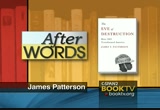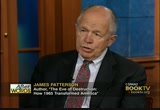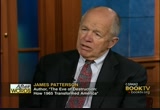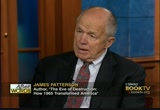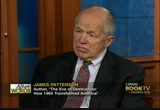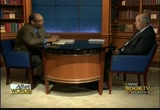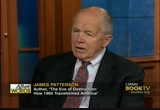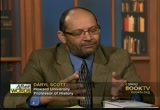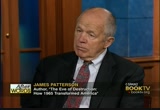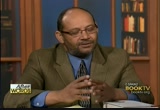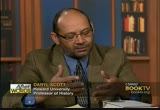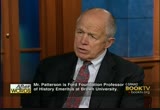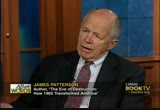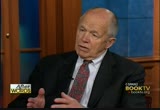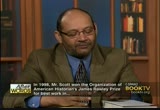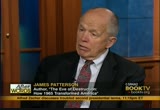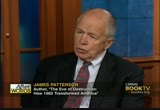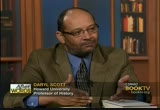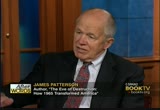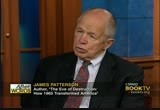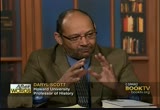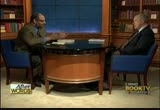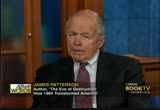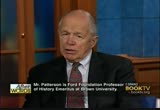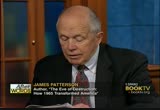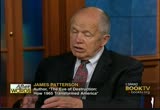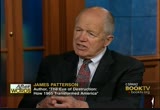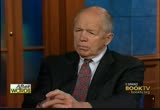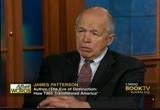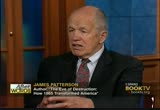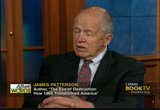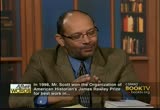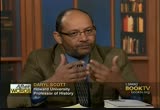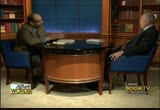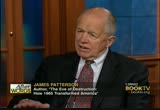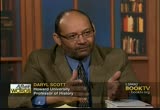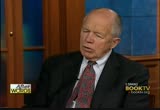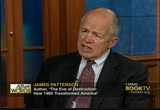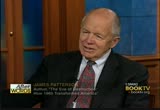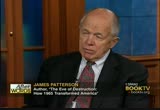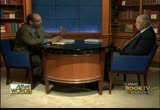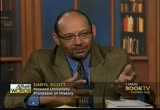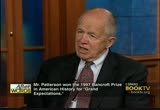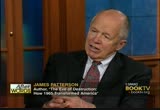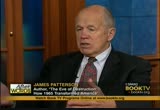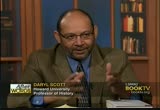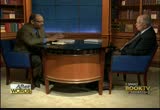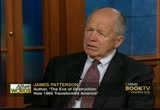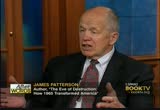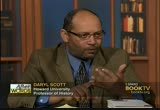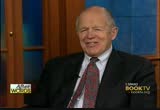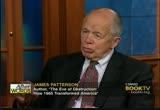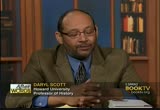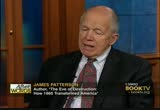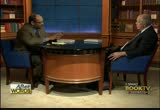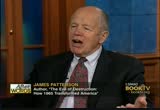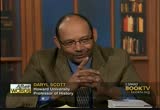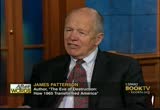tv Book TV After Words CSPAN November 18, 2012 9:00pm-10:00pm EST
9:00 pm
it's my pleasure to be here today to discuss your new book of the eve of the structure how 1965 transformed america. we historians love to ask one another how it came to be decided to write about a book giving the topic so would you write about 1965? >> guest: i taught the century american history for a number of
9:01 pm
years mostly brown university, so i really didn't teach the 60's because it wasn't history but later on that became an important part of my courses and then i've written some books which talked about aspects of the 60's and like a lot of other historians i became uncomfortable in the notion that the sixties could be described as something 1960 to 1976 so they like to talk to the 30's or the 20s or the 90's and so forth you can do that because of the power throughout the decade. mostly it doesn't work and here is the 60's i don't think it does either. because if you look back at what was happening in the early 60's, 60, 61, 63, 64, at least until kennedy assassination in
9:02 pm
november, 1963 and so much of daily life and popular culture and music and politics and so forth and the way people dress and so forth seem very much like the 50's and when we think of the fifties we think of a lot of turmoil, political polarization, urban riots, vietnam, rock concert and woodstock and so on and i became convinced that you really shouldn't talk about the 60's, 1960 to 1970 but something where the 60's start somewhere around 1965 which is what i've done. >> did you realize that at the time? did you feel your world change? >> guest: i mentioned in the preface to this book that i started teaching at indiana university in september of 64.
9:03 pm
there was my first job after getting my doctor at and i was busy preparing courses and my wife and i had a son in december, 1964, so i wasn't paying a whole lot of attention to what was going on in the world but it became impossible of course at the university campus not to be aware of the tension and delusions which were developing. while they were not particularly severe indiana university in 1965 it certainly became that way within a couple of years and they did on other campuses such as michigan which had the first teach and in march of 1965 a big rival of indiana you begin to see a lot changing. the students being addressed individually, much more, some of them at least, much more concerned with what's going on in vietnam. >> use all the change take place
9:04 pm
before your eyes. let me ask you this question. even though you saw the change taking place, when did you start thinking of the 60's as history? >> probably not until sometime in the 90's, the 80s or 90s. i'm pretty sure it wasn't until the 80's for instance a significant portion of my course syllabus which is 20th century history included a significant ratings on the 1960's. so maybe that is one answer to your question but of course a lot of people have been talking about the 60's even during the 60's. >> host: i've always been focused on books by one year. sometimes the historians like to talk about change across the time. that's pretty much what we like to do, and we like to talk about large swaths of time quite often
9:05 pm
in the decades. we even have this decade thing. but we rarely do a year, so there is a way that there is this close-up on the world on american society of a given moment in 1965. and is there a way that you can give a sense of how to unfold? in other words, how do we get to 1965 so that we can better understand the terms of the conversation about how much change took place? >> guest: first it's interesting how many books there are on the individual years in the 60's and i've mentioned some of the sinai process because people are going to say -- someone else said it is a 1968 it was a huge year. you had the tet offensive, johnson resigning deciding not to go for another term. later on you have nixon, the assassination of martin luther king and bobby kennedy, the democratic party is wild
9:06 pm
convention in chicago so a lot of books on 68 and in 69 and that sort of thing. there's also a very good book on 1964 which makes pretty much the same argument as i do you sense did a year earlier, and i wouldn't say if look i'm the only person that's right about this, but 65 did seem to be the time of who was the most dramatic, 68 probably was in terms of the world shattering events, but it was a time when the 50's and the early 60's rapidly vanished from or began to vanish from view in ariana the reasons you will probably ask me that, that's why.
9:07 pm
>> i pretty much agree with you that there's something more at stake in your book at least i think so. in any way we could even be talking about the 60's and just talking about where 65 fits into the 1960's but there is a claim in your book about how 1965 transformed america. and so they're in that statement it seems to be that you are saying that america is not the same after 1965 and that is what makes 1965 unique. so there is something at stake beyond 1960 and there's a way that one could argue in the years.
9:08 pm
>> i don't want to take it that far. nobody would argue that something starts on january 1st and then it's all done in december, december 31st. there are a number of things about the leader 60s for instance. other things happening in 1965 for instance the women's movement you do have the beginnings of it in the serious way in 1965 and then from the mystique it was published in 1963 but you don't have the organizing and various other groups and with television shows and the bonnie and clyde it's not until the early 70's when you have the all in the family
9:09 pm
show, so television is much more in line with the 50's, shows like bonanza and gilligan's island and that doesn't change. you do see significant changes in popular music and you will probably want to ask me about that. but the big changes are in civil rights and the civil rights movement and vietnam and of those do have very lasting effects. >> what seems to be suggested is that in the change if you will are the civil rights movements taking place within the movement and the war itself so that you understand the cultural transformation, the much broader transformation and you understand the black power movement more so than just a movement, the cultural transformation that is taking place in the black community you understand the culture transformation within the white
9:10 pm
community, and you understand ultimately in the cultural war if you will coming out of the sixties which would have began in 1965. and so that seems to be what is at stake at one level but it also seems to be at stake in another level. all of the political strength in the narrow cultural war if in reference to 1965 and the great society's so the big players in the game for the civil rights movement and the lbj's administration was more general because i think about the third factor in the great society itself so those are the three things and it's all related if you will to lbj. so in a way we talk about the importance of lbj in 2008 but
9:11 pm
clearly she was a central player in the unfolding transformation of american society. so let's talk about that. >> guest: if there were a movie on this book which of course there won't become he would be the start. he of course takes over after the assassination in november of 63. in 64 he is getting organized, preparing to run for the election on his own and he does. he tramples barry goldwater and along with him he gets a huge large democratic majority in both houses of congress. some people later on like and what obama did in 2008, but obama's mandate was i no means clear as the johnson's was and
9:12 pm
he had a whole year plus 13 or 14 months to be thinking about what he would do in his own right after that election of 64 when he is inaugurated in 1965, and he jumped right in with his great society program and he had a whole series of special committees and so forth had been studying issues, education, poverty, welfare, urban problems and so forth of task forces and had all these reports ahead of him in the congress of 65 started and he staged the hugest inaugurations ever. the only thing was obama in 2009 and he hits the ground running in a big way with a series of speeches and proposals and messages to congress for
9:13 pm
medicare, medicaid, elementary and secondary education as it became called, title i education , the creation of the housing and urban development cabinet and ended up supporting the first in 1966. so, yes, the great society and the passage of that i don't know how johnson does it is front and center particularly early in the book and then a lot of things happen that don't prevent him from getting things done but do change the public's so by the end of the year ronald reagan is running and as you point out in 19661 beat pet brown who four years later beat nixon. >> guest: >> host: what i find amazing is that it comes out of nowhere. there is no predicate.
9:14 pm
the progressives even come out of the turmoil in 1890. of course we know the new deal comes out of the turmoil in the great depression and we can even argue that obamacare comes out of the great recession. where in the world as the great society come from? and i and you answered that question and when i was a kid in this period 7-years-old pocketful in 64 we went in and around the neighborhood we won the war of 1964 and this is about the election. for that kind of way one could not have predicted the revolution and social policy that became the great society
9:15 pm
and your answer for that seems to be the sheer wealth of america. could you talk about that? >> the economy had been growing nonstop since 1961, and it was absolutely powerful moving ahead like a steam engine in '64 and '65. they had trouble in late 65 and later they were minor but in the early 60's it's called land expectations this was the time of grand expectations in the grandiose expectations and johnson was larger than the state of texas he wasn't much of a speaker but really on top of everything, people of contract for instance to obama he doesn't
9:16 pm
come out well on these contrasts when you talk about the way that johnson managed congress. he was constantly on the phone, constantly in the white house aware of every single committee room and really on top of things and clearly he wanted to get these done. people used to think that johnson was this kind of characteristically mild and a boisterous and a conservative component of civil rights, but i want guarantees background but by 1965 he was a strong liberal and could do good things and he wasn't getting them done. >> host: so much of what has happened in american society i should say during the late 20th century with -- you go through the protest was it socialists or just the liberal protests every
9:17 pm
demand would be prefaced at some point with the wealthiest country in the world. how could this be in the wealthiest country in the world and as understand that period of history it seems to be a throwaway line. but yet even the wood was a cliche it was one of the most truthful statements in the period that everyone believed america should be bad because we are just a filthy rich. what went wrong with this? the eve of destruction. what is the meaning of this title? i must say i know a lot of the
9:18 pm
60's songs that is one that i didn't remember, but tell us about the title what does the destruction mean to you? select the title i have to admit i think is not ideal in some ways because it leaves the impression that somehow by let's say early 66 the eve of destruction, there was a distraction and 65 when this happened. to do that you would have to forget what we were just talking about which is to say there's an incredible outpouring of the liberal legislation that johnson got through. medicare, medicaid, reform of a racist immigration law that went back to the 1920's, the voting
9:19 pm
rights act which not many people thought would be able to be legislated in 1965 including johnson because he thought it would start another deutsch filibuster from the civil rights act. more money for the war on poverty and all the other things i mentioned in the national endowment for the arts and humanities and in the secondary education act which is the first time the federal government put a lot of money into america's public schools for general education. these had been on the docket for years like the education act, like medicare. harry truman had the national health insurance which was much broader concept. >> host: tell us the title for a moment. using 1965 as the eve of destruction. i am a conservative for the sake of argument to get to me, 1965 looks like destruction itself.
9:20 pm
it was media 1964 but everything you talked about this is the world gone to held in a handbasket. there's a few of these you almost assume the share assumption. >> there is. this is 65 is destruction, this is the great society. this is the state run mad in 1965. this is the voting rights act. now we are about to have a federal government in effect seat in the americans' health and get involved in elections until this very day and some people would have said 1965 that really they started voting and it wasn't that big of a deal that soon they were voting in
9:21 pm
the cities, the rural areas were not that important anymore and they were increasingly less important. and so had this not been done, the arc of change reflects that they would have their voting rights and technically always had so 65 itself is the imposition of the liberal state. on the other hand and my progressive friends say the eve of the destruction this is the eve of creation. this is the eve of the new world which eventually women would have more rights and is indeed there is a rights revolution, blacks get more rights, women get more rights and finally the integration wall that is going to transform america that put together the obama coalition that we now know that includes the multi-cultural politics.
9:22 pm
so, while this is the eve of creation and all we have to do is have a vietnam war to make it work would you say to that? >> i start the book by giving quotations from people like the gingrich and george webb, he was certainly a conservative and most people think he is conservative the saw in 1965 looking back he actually picked the south and they called it the hinge of the 20th century and that is the title of one of my earlier chapters. this is looked back upon as it was at the time by conservatives as the end of the world. >> you cannot understand the revolution without 65. it makes no sense because their revolution was about undoing the great society, and it's the success, the relative success they have led some people back to undo other programs, but it does seem to be that the title itself, so really what is the
9:23 pm
title mean to you when you think about in the context of 1965 because i think there's some -- >> it really means that their relative widespread optimism and how your expectations. at the very time there are much weaker and we are never going to reach that stage. i start with an incredible statement that johnson made letting the national christmas tree in december of 1960. to give you a sense what he says here seemed plausible to people.
9:24 pm
he said these are the most hopeful times and all of the years since christ was born in bethlehem. he added this is december 64. today man has in his possession the capacity to end the war and preserve peace to eradicate poverty and sheer abundance to overcome the disease and permit all of mankind to enjoy their promise in life on this earth. he believed that was the case. james ruston of "the new york times" echoed this notion in a column at the start of 1965. time magazine had a special issue title on the verge of a golden era. all of these were in early 65. in january, 1965, we were not supposedly in the combat in
9:25 pm
vietnam. in 1965 we had passed the 1964 civil rights act which is the most important single act in the 20th century history. and then you had the war on poverty and it just seemed as if you were only a liberal and you were aware of all of the problems in the country, here we are finally going to deal with these and this was terribly important because it made people confident not only that they could go about their daily lives and they would be better off every year and their children would be better off than they were, the country, the government would be able to raise the revenue to pay for these programs. so it is a very unusual reform period in american history. so many of them like in the 50's for instance and to some extent
9:26 pm
progressives would come out. this time he didn't necessarily have to do something. many of the things that were done had been on the agenda for a long time. and so, that is just the destruction that doesn't fit that part of it very much. what really makes this title useful has to do with what happens in the civil rights movement and what happens in american foreign policy. now, to the extent that the destruction is the result of things that lbj did and did not do, how do you -- i admire how you on a fold of that story of course people have a lot of treaties about that, but it is still important for us to understand that it is a 1965
9:27 pm
that if johnson had handled the war differently in 1965 maybe things would have been much different. as a talk about that some. it's fascinating it's always easy to look back on the present does when he gets into something as awful as vietnam you want to look back and find out the point we could have gotten out of this and avoided and the was the time he did the board on this issue and got himself for the summer of 65 and got so heavily involved in combat in vietnam there was simply no getting out of it. in fact johnson himself loses he
9:28 pm
knew this was one of the tragic things about this she knew when he insulated the war that the united states and south vietnam were not going to win or defeat or invade north vietnam. but they were going to do if they could was to preserve the independence in south viet nam and that is the most they could hope for and they were not even sure about that. it was in 65 that he bites the bullet and in january 1st, 1965, the united states has around 23,000 troops. they are called military advisers and this was about 7,000 mark the 6,000 more in the 16 or 17,000 they were there in november of 1963 when kennedy was assassinated in the space of a year he has increased from 16 to 17,000 to 23,000.
9:29 pm
this is a considerable percentage increase but it's not a lot of people. they're not in combat. the only combat that had occurred was during the gulf tonkin crisis in august 64 when johnson retaliated by bombing the north vietnamese but that lasted for only two days. during the campaign he acted as if he were the reasonable moderate in vietnam which was easy to do since goldwater was very much a hawk on the issue. he's inaugurated in january of '65. the situation is the same but there is a raid by viet cong in the northern part of the country with south vietnam so the
9:30 pm
americans are killed in their beds early in the morning and he uses this as a pretext to retaliate the bombing of the north viet nam and that bombing then escalates and becomes something known as royal rolling thunder within a month and we are up and running. agent orange, the whole bit. that bombing starts in early 1965. in march of 1965, because general westmoreland and vietnam is saying that the americans around the air base for which these are taking place on north vietnam, the protection they are being attacked by viet cong you have to send troops over so johnson send some submarines and early march on the same day bloody sunday. that is the beginning of it and then there's another huge
9:31 pm
escalation in july of 1965 to go from 23,000 come supposedly non-combat troops although some of them have been in combat but by and large, they are not. and then at the end of the year is 184,000. 184,000. >> is johnson responsible for everything but westmoreland, you often get this sense that was more limited bad decision were to based upon his understanding of the warfare that he couldn't quite conceive. a way of putting this is when lbj and west berlin would realize they couldn't stand up on their own they could have made a different decision. when they realize that this government was going to fall, but it wasn't going to stand
9:32 pm
upon itself that was the real flaw in the decision making process is about the space at that point for america at some level, but there is a way that i thought of as much later that you're making a fairly clear that they understood this in 1965 they were propping up. they knew they were not going to win. so a different decision, and then it strikes me because there's something we don't talk about much anymore, which of course was all of the rage when people would talk about that. we don't talk about the world we could talk about our current crisis this way gone versus butter seems to be more of a consensus now about how we do domestic and international affairs and foreign affairs so we now believe that you always
9:33 pm
have gone even at the expense of butter but back then was almost an understanding that he could have guns or butter and that most people would have wanted the bader if you will. but we also have to find out that it wasn't the conservatives that got us so there is a way in which everybody was happy that the war was in america but there was just north and better if you will, and then johnson and busts and guns and he goes off the war. i spent a lot of time trying to explain why he did this because as you describe it, it sounds crazy. johnson like kennedy, like eisenhower, like truman, from truman, eisenhower and kennedy, all three presidents were on record as a majority of the congress saying that the united states, the head of the free world in what was still a very
9:34 pm
strong cold war climate, first the bay of pigs that the united states had the responsibility to protect the independence of the nation's from a communist aggression and this meant south vietnam. kennedy had raised the troop levels. i won't go into all of the things truman and eisenhower did, but right along we are heavily involved in protecting south vietnam, and johnson believed that these prior commitments committed him. he also was a strong warrior he used to comment often on how the young people that were protesting simply didn't understand communism because they had never really grown up or have to fight world war ii. they didn't know what appeasement meant he and chamberlain and so forth given to the nazis. the united states must keep its
9:35 pm
commitments. it must be strong. as johnson's great misfortune to be president when you either have to cut the base and i did you are right. >> host: you are referring to the domino theory and devotees as crime to the domino theory. i never bought the domino theory. this has always made the period in history that is a big flaw thinking of you put up a solid wall not just in the united front but no opposition on these issues and not let them have one to take all but appeasement is what it would be called as opposed to a strategy to defeat the opposition in the perpetual cold war to divide and conquer. i have always understood it does
9:36 pm
divide and conquer. that's how we deal with the opposition. and so, johnson was saying in effect that eisenhower had he been in office might have felt compelled at a certain moment to invest more but clearly with the domino theory in place there is a likelihood that the frigate deal would have at least felt a tug to go deeper into vietnam. >> guest: johnson very much feared that if they were to fall to the north and there was all that and became part of a communist country that he would suffer the same fate. he said this often truman suffered under mccarthy and various others that the united states, quote, left china has of course it had been hours to use the this was fresh in memory of someone like johnson who had
9:37 pm
been in the congress since 1937. and who was the majority leader in the early 50's when mccarthy and the minority and the leader in the senate in the heyday of mccarthyism she didn't want it to happen to him so it was a combination of good politics but also he had no choice but to do it. he felt this all the time. that is what is tragic to you he had no exit strategy. >> host: there are a couple things about this that struck me he didn't want to go deeper into vietnam's a there was support among people who had impeccable foreign policy to not forward so he would have some -- she would have had some support from a
9:38 pm
significant support so he could have done something different. on the obverse side of this, i'm still struck by how johnson was well aware as a master politician but there is a relationship between guns and butter that even though this is a wealthy nation we cannot run the deficits. we still have to move forward with an economic footing and that was going to have consequences for the domestic program. even johnson and the most liberal of any american administration was very clear on this that he couldn't spend limit leslie and he knew that this war would impinge on his domestic agenda this was well understood. >> guest: and it did. it didn't affect spending that much in 1965.
9:39 pm
all that many americans die in 1800 were in 1965. it went from 123,000 to 184,000 of to 400,000 in 1966 which was a terrible year and 550,000 at the time johnson leaves office in early 1969. so, even then it isn't enough to win the war. >> host: would also strikes me as interesting is that we think of the war opposition as astute and there is a way that there is no war, if there is a move what is also striking is the kind of opposition to the war among the chattering class is and the
9:40 pm
people in business this war had an opposition from the is travel to and from the very beginning. >> guest: actually i don't make much of that. it is true there were a lot of professor is engaged in the teaching movement for instance having been on a college campus i can attest to that. but, actually what is striking about 65 is virtually all of the public opinion polls depending on how you ask the question does show support for johnson's escalation, and it's not until 66 and early on becomes difficult and one can write a book on 66 and what is going on in the vietnam and what is going on in the federal budget. this is much more consequential than it was in 1965. this is where it all starts. once you are in very just gets deeper.
9:41 pm
that's what i mean by the restriction. you just can't get out of it. after that, nothing is the same. >> host: lbj is not in control of everything. every president learns there are presidents of power. so much of this is going on in this society. even before the war. now you have to channels on which this is taking place. the great society is sitting in the middle of the vietnam war sitting on the other side there of course is the black movement which you spend time talking about the that the other side is the response of the students to the war. 65 is a way in which you look at what happens early in the year malcolm x was assassinated in you wrote the film and in the course what we haven't mentioned yet is in august you have the
9:42 pm
right depending on how you interpret the event so here are these big developments that are taking place in my mind you seem to give an equal weight if you will to the unfolding of the 60's with what is going on in the civil rights, and the way that you almost set this up, you almost droll the consensus take on the movement. if i were a southern white, i would say the eve of the destruction was either 54, 57 or 64 if you will. but it suddenly wasn't when it comes to civil rights so that maybe their perspective. let's just talk about that for the second? as a kind of criticism you can almost assume that we are on board with civil rights and 64
9:43 pm
to be managed that much. >> host: rac 64 as i mentioned before as a year of enormous strides in the civil rights movement and here i wrote a book on brown v. board case you mentioned in 1954. and as you know, as a free latinos, this was supposed to bring about an end to the racial segregation in the public schools. in 1964, virtually no black kids were going to school in the deep south. in ten years they had virtually no effect. s and affect all of the civil rights activism on the earlier 60s at the beginning of the sedan and 65 was the freedom ride and in 62, 63, birmingham and so forth.
9:44 pm
this was necessary as was brown v. board. they are not sufficient and they bring these two together from the bottom-up and from the top down. then you get this powerful civil rights act passed in 1964 and this was a wonderful thing. there was more to be done on the voting rights for instance, but i would say yes, this is my take. you do have a lot of problems in 64. i'm calling to the summer things are getting really nasty. a lot of them are long day and so forth and so on. nobody can read this book and conclude there was in the violence going on. there was. but there was also the sense
9:45 pm
that the we were making gains and then on the very first day of the year, martin luther king opens up his drive in selma and that takes a good chapter, long chapter early in the book and most people know the story but you have this bloody sunday when they beat up people including john lewis and said a lot of people to the hospital and it's all one television and he goes on tv and says we shall overcome and comes out with the voting rights act that passes in he says that is even more important in the 64 act. very important. and however, during the course of this, it should be regarded as movements were already there, and in fact the student on violating coordinating committee which had already been working for the voting rights act in
9:46 pm
selma presented martin luther king coming in. they trotted off and on but there was virtually no meeting of the mind between sncc and the southern christian leadership conference and martin luther king on the others and you begin to see the split within the civil rights movement that's pretty irreparable. >> let me play the devil's advocate on this. there are a lot of people who talk about the black freedom movement, and they see that movement in terms of civil rights or civil rights and black power to say social and political influence they see it is something to have a goal. others might say that okay, you're right. 1965 by that time they have the civil rights and voting rights.
9:47 pm
let's move on. i don't think the split in the civil-rights movement is inherently important. selma still leads to the voting rights act. it's not inherently important in the divisions among sncc. but why? the world changes in the course of 64 there are the rights in philadelphia and in harlem to mean something. it isn't even the sheer violence of it. i think a lot of it has to do -- i think people were shocked by the right in california. tell us about that and how does it change the movement or the
9:48 pm
way that people perceive civil rights. what does it do to the black community, what does it do to white liberalism? what happens? >> to the white liberalism what it does is a number of liberals were shoulder to shoulder with blacks in the south, some of them got killed and lots of them sat back and said these guys are not like the nonviolent civil rights people, they are hoodlums. they are bad people fighting police bringing down buildings, and so this sort of makes a lot of white people cautious. they are not really sure what is happening here and they don't like what they see. i'm not saying it to give up on freedom struggles. johnson doesn't give up on the freedom struggle. he continues to try to get legislation after this although
9:49 pm
initially staggered how could this happen. he's done more than any president by far that happens under his watch and he was just really shaken by this but he got over it. a lot of others were uncertain. but even johnson realized he had made this enormously powerful speech where you teach at the commencement in june and written by daniel moynihan the speech that basically calls for the affirmative action in terms of social policy, not in terms of the university admissions but they have special means and social policies to call the white house conference in the fall this changes that. everything gets reinterpreted. johnson wasn't and the black people are not pure at the odds of white and white or not you're in the eyes even of the leadership of the black
9:50 pm
community, and of course then you get the lines in leadership and of course malcolm x died in february, but they don't really seem to get traction on tell what? he makes everybody rethink everything. it makes some people think there's a black revolution that is going to overthrow the united states government. so he gets people thinking. so in my mind, there is a way in which i could say 65 is important and there is a lot going on as the great society that is important. there is a vietnam war that's important, but the destruction really starts in two places. watts and then the other place that we haven't mentioned yet, the students for the space society and how they are transformed by the war. you make a pretty big case that until the escalation sds is a
9:51 pm
small-time operation. >> guest: it's not even at the end of 65. but it's getting there. >> host: be provocative, we only have a few minutes left. this plays. if they had been a professional military, no draft in 1963, with the 60's as you know it then is the very reason that i would argue that we ended the draft, right fax that we have a professional army. you do not want the citizenry to decide what war you should fight because you might mobilize the opposition to it. so let me ask you in 63 had you had a professional army would have been different? would the 60's have happened?
9:52 pm
>> guest: this is assuming we still don't have a draft, but obviously what you are saying we can't ignore. a lot would have been different because s ds had a radical notion in the country. they were not just opposed the vietnam war. they were the number one issue as of 65. in 64 they were divided about what they really want to do. they thought that we should still worry about poverty. 65 is an antiwar organization but a lot of people are anti-war iraq and are not being radicals. this is a bad war and we are redrafted. but they had a notion that the fact that the united states was in miss war and so many others was a sign of the greed of capitalism and the other sorts
9:53 pm
of inequalities that exist in the country, and you have to fundamentally reshape the country but not many people bought into that. and they didn't want to get drafted so here the counterfactual expectation makes you think. >> host: it is a counterfactual it would have been hard to imagine where they would have gotten half a million but again we did have an urban crisis and so perhaps there were more people around who might have been susceptible to enticing. they were susceptible in the 1970's when the economy wasn't going so well. so maybe they could have built up an army i don't know if they could have as quickly but clearly the war drove in
9:54 pm
opposition and the opposition was based largely on the draft. in other words, do you expect that kind of proposition that without that draft, sts may have had a leadership concerned about some issues that the mass that they have seen for several years wasn't just tied to the immediate self-interest? >> guest: it is overwhelmingly entire war. some of the people in sts -- sds and john lewis for instance and james former, the head of core, martin luther king they were opposed to all war and violence they were consistent, it wasn't just vietnam but most of them this was a data war.
9:55 pm
>> host: there is a transformation we talked about earlier that takes place, and that is the hardest transition i have to find that i know by 66 or 67 certain things are going to happen with music and with the war but the change does seem to take place by the end of 65. in other words, is it the war come visit the escalation of the war that leads to some eve of the destruction? do you think there is a war driven in other words is it the escalation? >> guest: it is that song and it talked about selma and racism and nuclear weapons and talk about vietnam and it's a large soundtrack with guns blowing off and september of 1965 was a
9:56 pm
popular song at the end of the year and was one of the very first songs, popular songs the was antiwar and popular, and if you listen to it, it's hard to see why. it has kind of a nice easy to but it's words are strong and loud and it's up the whole world is coming apart and the sense of apocalypse here. >> host: it seems the cultural transformation is as rapid as the escalation of the war. it's amazing. it's true music changes somewhere between 64 to 66 within that time period commesso it all changes in that time period, and it seems to be related once again to move the
9:57 pm
change in the civil rights movement from the civil rights movement if you will to the black power movement the change from if you will the full music to rock-and-roll as is being tied to any notion of the social full crock and changing to an electro sound antiwar sound. so you see it there and it happens with the war so i am willing to see that if i had to choose one year to say it's the most pivotal year in the 1960's, and i dare say -- and lighting to make the case maybe you don't really want to make the case with the broad political structure of the politics, democrats versus republicans is all coming out of the great society so they make a great
9:58 pm
case. >> guest: i want to say one other of thing about the music. everything lined up nicely in the story and to make an argument at the very time when you have the destruction becoming the popular song, you also have in the early 60's the ballot of the green berets which are the strong psalm based upon the green berets that was a popular book so i'm trying to make this argument there's all this exception and ambivalence in the division. >> host: we have run out of time but i would like to talk about the relationship and the similarities between setting of a green beret. but things a lot. it's a very interesting book. it grabs the reader. i think a lot of people will enjoy it and it is given where we are now given with obamacare and the liberal ascendancy if you will it seems to be a shift
9:59 pm
taking place. that was "after words," booktv signature program in which authors of the latest nonfiction books are interviewed by journalists, public policy makers, legislators and others familiar with their material, afterwards that is a free weekend on book tv at 10 p.m. on saturday, 12 and 9 p.m. on sunday and 12 a.m. on monday. you can also watch "after words" on line. go to booktv.org and click on "after words" in the book tv series and topics list on the upper right side of the page. ..
164 Views
IN COLLECTIONS
CSPAN2 Television Archive
Television Archive  Television Archive News Search Service
Television Archive News Search Service 
Uploaded by TV Archive on

 Live Music Archive
Live Music Archive Librivox Free Audio
Librivox Free Audio Metropolitan Museum
Metropolitan Museum Cleveland Museum of Art
Cleveland Museum of Art Internet Arcade
Internet Arcade Console Living Room
Console Living Room Books to Borrow
Books to Borrow Open Library
Open Library TV News
TV News Understanding 9/11
Understanding 9/11